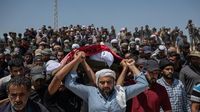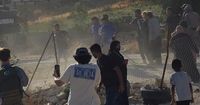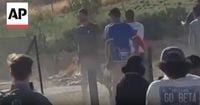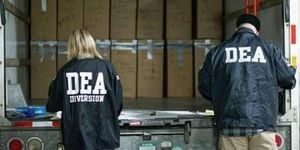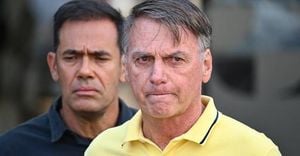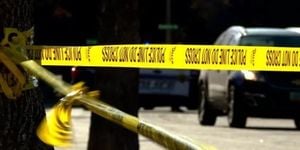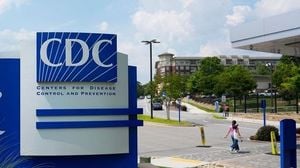In the small Bedouin village of Umm al-Khair, nestled in the South Hebron Hills of the occupied West Bank, the echoes of grief and outrage have yet to fade. On July 28, 2025, Awdah Hathaleen—a 31-year-old Palestinian activist, English teacher, father of three, and documentary filmmaker—was shot and killed during a confrontation with Israeli settlers, an event that has since reverberated far beyond the village’s boundaries. The killing, captured in harrowing video footage, has reignited international scrutiny of rising settler violence and the persistent vulnerability of Palestinian communities living under occupation.
The incident unfolded on a sweltering summer afternoon when Yinon Levi, a settler with a notorious reputation for confrontations against Palestinians, arrived in Umm al-Khair accompanied by a crew and an excavator from a nearby settlement. According to B’Tselem, the Israeli human rights group, villagers gathered on a dirt road to prevent the excavator from advancing, fearing it would sever the community’s main water line—a lifeline in this arid region. At least one person hurled a stone at the excavator’s windshield, escalating tensions.
Video released by B’Tselem on August 10, 2025, and reviewed by multiple outlets including NPR and The Associated Press, shows Levi waving a handgun and firing it twice toward a group of unarmed Palestinians. The footage, reportedly filmed by Hathaleen himself, cuts abruptly as the camera drops and the sound of moaning fills the audio. B’Tselem stated that Hathaleen was standing about 40 meters from the confrontation, near the community center he had built for local children, when the bullet struck him in the chest. He collapsed instantly.
Eyewitnesses told The Associated Press they saw Levi shoot Hathaleen. Yet, despite the video evidence and multiple witness accounts, Israeli police detained Levi for less than 24 hours. He was briefly placed under house arrest before being released by an Israeli court, which cited insufficient evidence and concluded that Levi did not pose an ongoing danger. The judge barred him from contacting villagers for a month, but no charges were filed. Levi’s lawyer, Avichai Hajbi, insisted his client acted in self-defense, though details of that claim remain vague.
Levi’s notoriety extends far beyond Umm al-Khair. He is currently under European Union sanctions for human rights violations and was previously sanctioned by the United States until the Trump administration lifted those restrictions in January 2025. According to anti-settlement activists, Levi helped establish a settler outpost near Umm al-Khair, which has been accused of violently displacing hundreds of Palestinians since the start of the most recent Israel-Hamas war.
For Hathaleen’s family and community, the aftermath of the shooting compounded their anguish. In accordance with Muslim tradition, the deceased should be buried within 24 hours. However, Israeli authorities withheld Hathaleen’s body for 10 days, insisting on restrictions regarding the funeral’s size and location. Only after his family accepted these conditions was his body released, allowing for burial on August 7, 2025. The funeral drew family, villagers, journalists, and European diplomats, who parked their SUVs along the narrow road separating Umm al-Khair from the fenced-off settlement of Carmel.
Annika Malki, a Swedish diplomat, joined other European officials in the mourning tent, offering condolences to Hathaleen’s brother, Khalil. "It is a terrible crime and it shows how vulnerable Palestinian communities are," Malki said, according to NPR. "We take this very seriously in Sweden and we would like to do what we can on our side." Khalil, in turn, pleaded for protection: "We hope from you to protect the local community here, because we're being exposed to cleansing. Look around you. There's no problem, there's no military, no one's evicting us—because you're Europeans and you're here. But the moment you leave, they're going to come here."
Hathaleen’s activism was renowned both locally and internationally. He was a key figure in the Oscar-winning documentary No Other Land, which chronicled the struggle of Palestinian villagers against settler violence and land encroachment. Rabbi Avi Dabush, CEO of Rabbis for Human Rights, remembered him as "our friend and he was a partner," saying, "Awdah was the most peaceful person. He was the person that always gathered us—and he was shot in front of the community center that he built for the kids to play and to have summer camp and to learn." Hundreds of friends and supporters from around the world joined a Zoom call to mourn him, and his name has appeared on murals in Rome, at vigils in New York, and on protest signs in Tel Aviv.
The tragedy has unfolded against a backdrop of escalating violence in the West Bank. According to the United Nations humanitarian coordination body (OCHA), attacks by Israeli settlers on Palestinians have spiked dramatically since the outbreak of the Israel-Hamas war in October 2023. Between January and June 2025 alone, more than 2,000 settler attacks resulted in casualties or property damage, with 647 Palestinians killed in the West Bank—six in settler attacks and most by Israeli forces. The UN Human Rights Office has condemned what it calls a "pattern of the use of unnecessary and disproportionate force that resulted in the unlawful killing and injury of Palestinians."
Israeli peace activists and former soldiers have also raised alarms about the changing landscape. Guy Butavia, who has worked in the South Hebron Hills for 15 years, told NPR that settler expansion and violence have accelerated under the current right-wing Israeli government. "In the last two years, it's a totally different ballgame," he said. "The rules of the game changed. We used to protect Palestinians when they were going out to graze their livestock. Now they can't reach their lands and can barely get out of the doors of their homes without coming under threat." Oriel Eisner, another Israeli activist, noted that after journalists and diplomats depart, the Israeli army often enters the village at night to arrest local men, deepening the climate of fear.
For Hathaleen’s mother, Khadra, the pain is raw and personal. She recounted how her son had been preparing paperwork for a trip to the United States when the commotion began. "He was inside preparing his papers. Then this guy came on the bulldozer and started cutting the olive trees. Somebody called for Awdah, so he went out. I followed—and there was blood." She said she tried to accompany her wounded son in the ambulance but was prevented from doing so, and was even struck by the same man who killed him.
The cycle of violence and impunity continues to haunt Umm al-Khair. Activists say that Levi, the man accused of killing Hathaleen, is often seen back in the village, operating his bulldozer—a stark reminder of the power imbalance that defines daily life for many Palestinians in the West Bank. As the world watches, the villagers of Umm al-Khair mourn a man who dedicated his life to peace, education, and the hope for a safer future.
